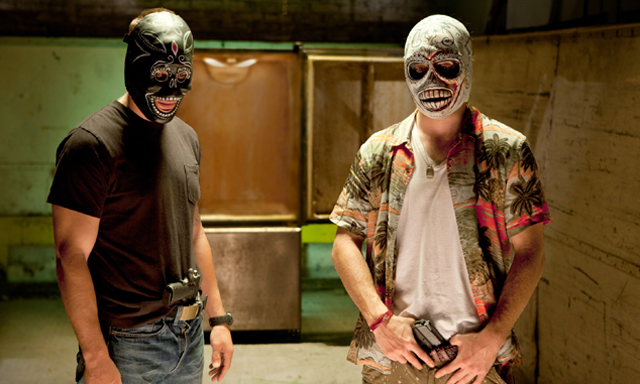 Film: Savages
Film: Savages
Country: USA
Year of Release: 2012
Director: Oliver Stone
Screenwriters: Shane Salerno, Don Winslow, Oliver Stone
Starring: Blake Lively, Benicio del Toro, Taylor Kitsch, Aaron Johnson, Salma Hayek, John Travolta.
Review: Peter Machen
♥♥♥½
Savages, the new film from Oliver Stone, begins with disturbing images of decapitated bodies. Broadcast from a web cam, the images are familiar in tone and content, echoing televised images from the American War in the Middle East. The images are not however from a war-torn territory, but from Mexico, where the drug trade has escalated and spilled over into marijuana territory, a traditionally chilled marketplace whose supreme rulers are Chon (Taylor Kitsch) and Ben (Aaron Johnson), two friends who produce not just the best weed in town, but the finest marijuana on the planet, and whose main market happens to be in Mexico.
When a Mexican crime cartel decides that they want in on the action, Ben, who wants to move on anyway, is prepared to give them the business. That, however, is not seen as an option by cartel boss Elena (Salma Hayek) and her head henchman Lado (Benicio Del Torro). With a little help from federal agent Dennis (John Travolta), a man with his hands in all the cookie jars, the two friends – one a peace-loving hippy, the other an Iraq War veteran – try to beat the cartel at their own game. The result is a beautifully stylised and highly enjoyable thriller that is fuelled by a tense but stoned lyricism.
While Savages is an easy film to enjoy, I’ve been struggling to work out why I enjoyed it so much more than many very similar films whose story and plot structures it echoes. And beyond the fact that Stone grants all of his well-cast characters something akin to fullness – even if their actions aren’t always believable –– my fairly bland observation is that the director has simply done a particularly thorough job of producing a generic action film. If that stops a little short of full-on praise, it’s precisely because the work is hugely conventional, even if its texture isn’t. And also, I think Stone can do better. Still, I found Savages enormously engaging. It’s a lovingly crafted film that feels like the perfect episode of a great television series.
That said, the shifts in the character’s behaviour weren’t always convincing. Ben’s gradual acquiescence to violence doesn’t ring true, while Elena’s brisk shift to gentleness in a later scene feels forced. The characters are pulled by the storyline rather than the other way round. Still, Hayek gives a particularly interesting performance as a camped-up matriarch without much left of her family. She is playing a woman whose every action is performative and her showing in the film is, if not brilliant, at least brilliantly charismatic. She is the counterweight to the languid, blissed out performance from Blake Lively as Ophelia, a rich but not entirely spoilt beatnik/hippy chick who narrates the film and who loves and sleeps with both Chon and Ben, and who bathes the film in a poetic haze mottled with lucidity. Without these two woman, Savages would be a simple buddy B-movie. As it is, it’s a highly entertaining heist flick without a heist, an A-grade Hollywood thriller that twists and turns without ever turning down a blind alley or trying to trick its audience.
Yet I’m a little suspicious of the fact that I walked out of Savages in such a thoroughly upbeat mood after having watched a good dose of disturbing violence. While I should point that the film generally shows us the results of violence rather than the violence itself, this is kind of a moot point when you’re dealing with decapitations. While Stone doesn’t revel in these moments or give glory to human pain and suffering, his film does, like so many other movies, treat the victims of violence as fodder for its storyline.
But Savages isn’t entirely dumb, mindless entertainment, and Stone allows a degree of philosophising in between the cracks, including a contemplation on the relative nature of savagery. Some will find these brief digressions trite and insubstantial but I think they work for a film that says as much with tone as it does with words and actions.
There is a deeper and more specific lesson lurking in the film though, and I don’t blame Stone, who is after all a commercial filmmaker, for not bringing it to centre stage. And that is, that in a post-911 world, we live in a weaponised reality in which the weapons of war have become the weapons of crime and of government. Terror and violence have become, more than ever, a way of doing business, and business itself – whether criminal or otherwise – has become a sterling employer of former soldiers around the world. These facts exist only on the edge of Stone’s film but they are increasingly central in the real world, a world in which the slaughtering of human beings – in the crime fields of Mexico, in the public spaces of America, Africa and beyond – are seen by governments, freedom fighters, terrorists, armies and corporations, not as acts of war but as acts of control.
